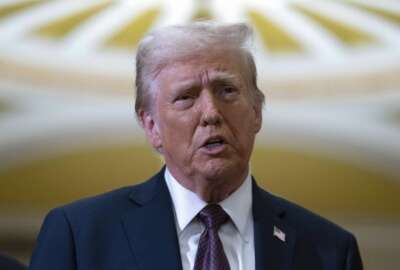Recovery Board’s Devaney ushered in ‘new era of transparency’
The outgoing chairman of the Recovery Accountability and Transparency Board said the work of the oversight agency was transformational in its way of approaching...
wfedstaff | June 4, 2015 2:39 pm
By Jolie Lee
Web Editor
Federal News Radio
The outgoing chairman of the Recovery Accountability and Transparency Board said the work of the oversight agency was transformational in how government identifies and prevents spending waste and fraud.
“I enjoyed ushering in what I think is a new era of transparency and accountability. The Recovery Board was afterall a giant experiment in those two areas,” said Earl Devaney, who is retiring as the chief stimulus fund watchdog. He spoke with The Federal Drive with Tom Temin and Amy Morris a day after submitting his resignation letter to the President. Devaney said he is already overdue to retire, having told his wife four years earlier he was ready retire.
Devaney became head of the RAT Board when it was created as part of the American Recovery and Reinvestment Act of 2009. President Obama appointed Devaney to head the board, consisting of 12 inspectors general.
At the beginning, the board faced some big challenges: Stand up an agency, build reporting and transparency websites, and set up protection modules for the funds — all within six months, Devaney said.
Devaney said the enforcement tools available today did not exist earlier in his 41-year federal career. For example, the RAT Board used analytic tools that have worked in intelligence and law enforcement.
“The novelty of what we did was to use those tools on spending,” Devaney said. “I was delighted with the outcome that they’re just as successful in spending as they are in those other areas.”
The board created FederalReporting.gov, where recipients of Recovery funds submitted reports, and Recovery.gov, where taxpayers could track stimulus funds.
“Being able to go on a website as a citizen and drill down into your own zip code and find out where your government is, is brand-new,” Devaney said.
The Recovery Board helped changed the way government approached fraud, waste and abuse — from only enforcement to prevention as well. Devaney said that paradigm shift also changed the relationship between agencies and their inspectors general.
“For the very first time, it turns out when the goal is prevention, agencies and inspectors general have the same amount of enthusiasm and interest in getting involved,” he said. “Under the old paradigm, when the goal was simply detection, understandably the agencies soft of back off and let the IG’s do their thing.”
The government is trying to scale the RAT Board model to all of government spending, with the Government Accountability and Transparency Board. In August, Devaney was named to head the GAT Board, applying best practices used in stimulus fund tracking.
RELATED STORIES
Recovery Board’s Devaney to resign
Devaney: Embarrassment will lead to Recovery.gov improvements
Devaney shares lessons learned about transparency, openness
Copyright © 2025 Federal News Network. All rights reserved. This website is not intended for users located within the European Economic Area.





